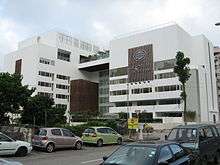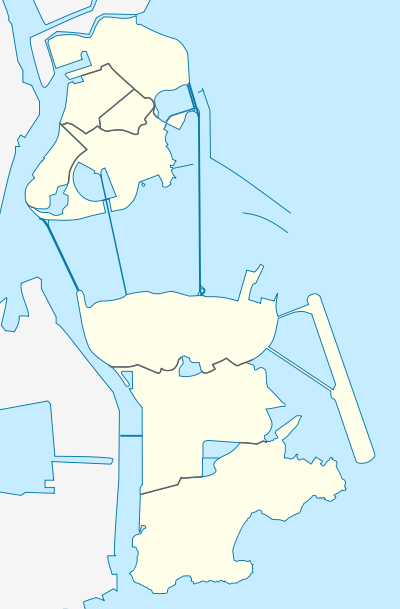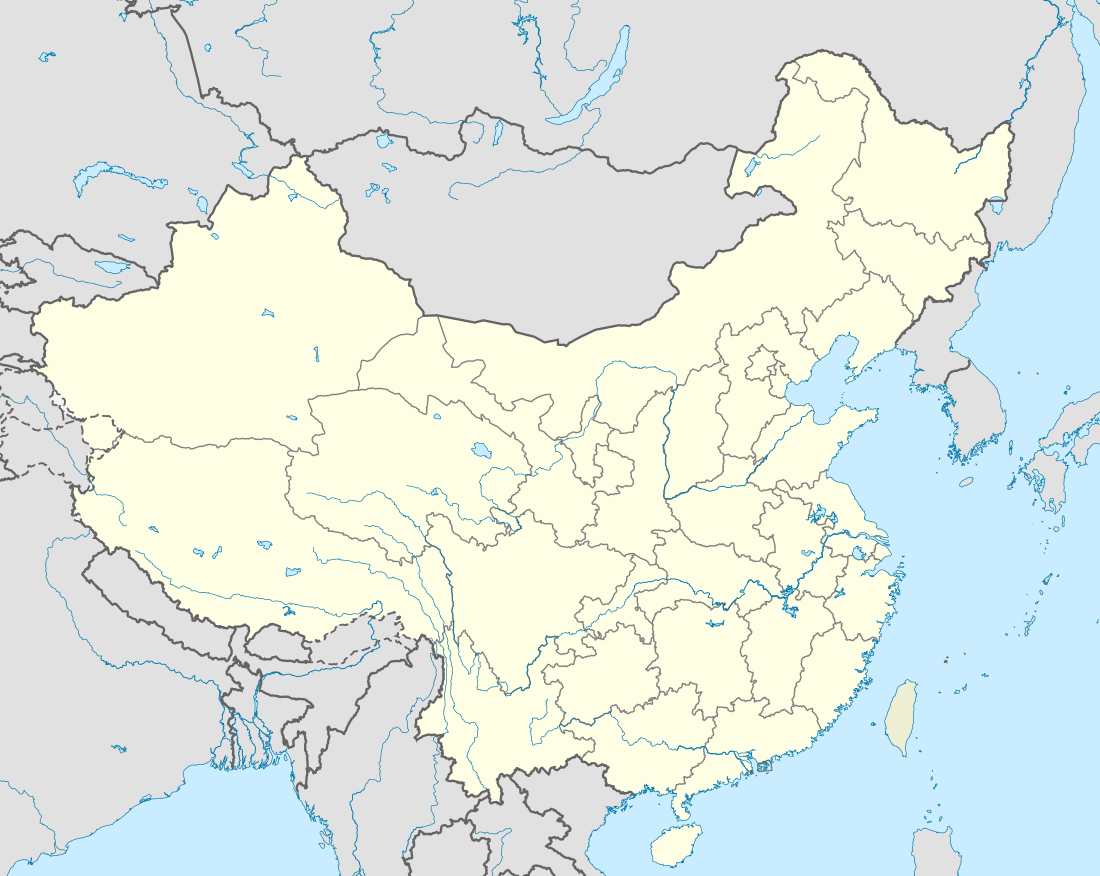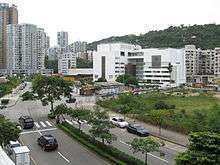School of the Nations (Macau)
| School of the Nations 澳門聯國學校 Escola das Nações | |
|---|---|
 School of the Nations, Macau SAR | |
| Location | |
 School of the Nations  School of the Nations | |
|
Rua Do Minho, Taipa 米尼奧街 Macau | |
| Coordinates | 22°09′36″N 113°33′03″E / 22.16002°N 113.55091700000003°ECoordinates: 22°09′36″N 113°33′03″E / 22.16002°N 113.55091700000003°E |
| Information | |
| Type | International School |
| Established | 1988 |
| Administrator | Vivek V. Nair |
| Staff | 100+ |
| Grades | K-12 school (Kindergarten to Form 6/Grade 12) |
| Number of students | ~600 |
| Colour(s) | |
| Website |
www |
The School of the Nations (Portuguese: Escola das Nações; traditional Chinese: 聯國學校; simplified Chinese: 联国学校; pinyin: Liánguó Xuéxiào; Jyutping: lyun4 gwok3 hok6 haau6) is a Bahá'í-inspired school located in Taipa, Macau.[1]
It is owned by the Badi Foundation. In 1988, as the result of the efforts of a number of Macau residents and the Government of Macau, the School was established. As an international school, it provides an internationally oriented English-medium educational program for both expatriate and local families. The school currently has approximately 600-700 pupils, of whom about 70% are from Macau while the remaining 30% represent approximately 35 different nationalities. The parents of these expatriate students, for the most part, are in Macau for employment, working in Macau's private and public sectors.

History
The School of the Nations is an internationally oriented educational institution, licensed by the Government of Macau, as a non-profit organization. It originally opened in 1988 with 5 students, all of whom were enrolled in kindergarten. It came about as a result of efforts from a number of Macau residents who saw the need in the community for an English medium school. By the end of the 1989-1990 school year, the original premises in the Seng Vo building were filled to capacity. The demand for new enrollments however, continued to rise. It was decided to acquire additional property on the fourth floor of the Lei San building as an interim measure while a more permanent solution was sought. These premises were occupied for the school year 1990-1991 allowing the school to enroll approximately 200 students (a 100% increase over the preceding year). A 35% increase for the academic year 1991-1992 and a 29% increase for the 1992-1993 school year brought the school to a critical condition of overcrowding. To accommodate the influx of new students, in 1994 the school began to lease commercial properties and convert them to classrooms.
In 1997 all of Asia experienced a severe economic downturn, and enrollment to the school dropped. The decision was made to return all leased property, reduce overhead and limit enrollments to the number of students that could be accommodated in the properties belonging to the school. From that period until 2008, the school maintained a steady population of about 260 students.
In 2008, construction of the School of the Nations building was completed. The building is located on Rua de Minho, on Taipa Island, not far from the Nova City residential complex. This new facility has greatly increased the school's capacity, allowing for a major increase in student capacity. Since then, the school has grown to approximately 600 students with around 100 staff.
Facilities
As a result of Macau's limited amount of land, the school was initially located in rented properties within residential buildings. Normal classes were held in modified apartments. Physical education and other outdoor activities were carried out in the nearby facilities of a government school as well as public facilities where the School had access to basketball and mini-soccer courts and swimming pools, while space in the Macau Cultural Center was used for school gatherings.
In 2006, Macau's Education Department gave the school a grant of 2,500 square metres of land on Taipa Island, as well as substantial financial support for the construction of the new campus.[2] The present school building is located on these grounds.
The current school campus spans 7 floors. The ground floor is home to the school's library and some of the kindergarten classrooms, while the 1st floor is home to the cafeteria and the remaining kindergarten classrooms. The 2nd, 3rd, and 4th floor feature mostly classrooms, with the 2nd floor being used for primary school, the 3rd for middle school, and the 4th for secondary school (see below for information on sectioning of grades). The 3rd floor is also home to the arts wing of the school, featuring two art rooms, two drama studios, and a music studio, while the 4th floor features a auditorium capable of seating approximately 200 people. The campus also features science laboratories and computer labs equipped with state-of-the-art equipment and supplies on both the 3rd and 4th floors. The 5th floor houses the school's gymnasium, while the 6th and 7th floors (Roof and Upper Roof) are outdoor activity areas used for sports and recreational activities. The administrative offices are spread across the ground, 1st, 2nd, 3rd and 4th floors.
Curriculum
Character development, the development of the spirit of social service and cooperation as well as environmental awareness,[3] is a strong theme in the educational program of SON.[2] Despite retaining a 2-section naming system ("Primary" and "Form" a.k.a. Secondary) the school uses a 3-section system to divide its grades internally - primary school, middle school and secondary school. This is in order to cater to the different needs of students in each grade better.
Its current standard curriculum for the lower grades (Primary 1 up to Form 2 a.k.a. Grade 8) consists of:[4]
- English
- Mandarin
- English Literature
- History
- Computer Science
- Geography
- Combined Science (integrating Biology, Chemistry and Physics)
- Mathematics
- Physical Education
- Art
- Drama
The character training program was awarded first prize in 1997 for innovation in curriculum by the Department of Education and Youth Services of Macau. It was also awarded 3rd prize by the International Schools Services in their worldwide competition for community service programs.[4]
IGCSE Program
The International General Certificate of Secondary Education (IGCSE) is an English language curriculum offered to secondary students to prepare them for the International Baccalaureate, A Level and BTEC Level 3 curriculums. It is based on the older GCE O-Level and is recognized internationally as being equivalent to the British GCSE. Students begin studying for the IGCSEs in Form 3 (Grade 9) and generally take the examinations at the end of the school year in Form 4 (Grade 10); however, high-achieving students in the English and Mathematics courses are permitted to take the examinations in said courses one year early (at the end of Form 3/Grade 9). School of the Nations currently offers courses in the following subjects for the IGCSE Exams:
- Biology (0610)
- Physics (0625)
- Chemistry (0620)
- English - First Language (0522)
- English - Literature (0486)
- First Language Chinese (0509)
- Computer Science (0478)
- Mathematics (0580)
- Additional Mathematics (0606)
- Global Perspectives (0457)
- Drama (0411)
- Art (0400)
- Music (0410)
The School of the Nations is currently the only school to offer the Drama IGCSE course in Macau. When starting the IGCSE program in Form 3, students choose to study either Art, Music, or Drama as their arts subject; in Form 4, they make a further choice on whether to continue to study and sit the exam for their chosen arts subject or study/take exams for Global Perspectives instead. The average grade achieved by a secondary student studying in the IGCSE program in SON is an A; most students achieve several A/A* grades.
I.B. Diploma Program
The International Baccalaureate Diploma Programme (IBDP) is a two-year educational programme primarily aimed at students aged 16–19. It is taken by students starting from Form 5 (Grade 11) and ending in Form 6 (Grade 12) with the examinations. The program provides an internationally accepted qualification for entry into higher education and is recognised worldwide. The School of the Nations is currently one of only two schools in Macau to offer the IB Diploma Program as a part of its curriculum (the other being The International School of Macau). The School of the Nations offers the following subjects for the IB Diploma Program (further subjects are also available for online study through Pamoja; those are not included in the list below):
Group 1 - Studies in Language and Literature
- English A HL/SL
Group 2 - Language Acquisition
- Chinese B HL/SL
- Mandarin Ab. SL
Group 3 - Individuals and Societies
- Business & Management HL/SL
- Psychology HL/SL
Group 4 - Experimental Sciences
- Chemistry HL/SL
- Biology HL/SL
- Physics HL/SL
Group 5 - Mathematics
- Mathematics HL/SL
- Mathematics Studies SL
Group 6 - The Arts
- Visual Arts HL/SL
- Music HL/SL
Students in the IBDP also have to write an Extended Essay not longer than 4000 words in a subject of their choice and complete CAS (Creativity, Activity, Service) experiences as a part of the program.
Scholarships
The school offers a scholarship to students who are in financial need and who have consistently and diligently demonstrated high academic merit. Scholarship recipients must also be noted for their cooperative behaviour, friendliness, helpfulness, respect for teachers and fellow students, and obedience to school rules. The scholarship is funded through ongoing fundraising efforts within the school.
University Admission Offers
As of 2017, students from the school have received university admission offers from the following schools, including conditional offers.
Australia
- Australian National University
- Macquarie University
- University of Melbourne
- University of Queensland
Canada
- Langara College
- McGill University
- Okanagan College
- University of British Columbia, Vancouver
- University of British Columbia, Okanagan
- University of Toronto, Mississauga
- University of Toronto, Scarborough
- University of Toronto, St. George
China
- Fudan University, Shanghai
Hong Kong
- Chinese University of Hong Kong
- City University of Hong Kong
- Hong Kong Baptist University
- Hong Kong Polytechnic University
- Hong Kong University
- Hong Kong University of Science and Technology
- Savannah College of Art and Design, Hong Kong
Jamaica
- University of West Indies Mona
Macau
- Institute for Tourism Studies
- University of Macau
- University of Saint Joseph
Portugal
- University of Coimbra
Singapore
- Nanyang Technological University
- National University of Singapore
Taiwan
- National Hsinchu University of Education
United Kingdom
- Hult International Business School
- Imperial College London
- King's College London
- Lancaster University
- Le Cordon Bleu, London
- London College of Fashion
- London Metropolitan University
- Loughborough University
- Nottingham Trent University
- London South Bank University
- Southampton Solent University
- The London School of Economics and Political Science
- University College London
- University of Bath
- University of Birmingham
- University of Brighton
- University of Edinburgh
- University of Manchester
- University of Nottingham
- University of Sheffield
- University of Swansea
- University of the Arts, London
- University of Warwick
United States
- Abilene Christian University
- Antioch University, Santa Barbara
- Baruch College, The City University of New York
- Berklee College of Music
- Boston University
- De Anza College
- Georgia Institute of Technology
- Johns Hopkins University
- Lawrence University
- New York University
- Pennsylvania State University
- Portland State University
- Pratt Institute, New York City
- San Diego State University
- Santa Barbara City College
- University of California, Berkeley
- University of California, Davis
- University of California, Irvine
- University of California, Los Angeles
- University of California, San Diego
- University of Illinois at Urbana-Champaign
- University of Michigan
- University of Oregon
- University of Southern California
- University of Virginia
- University of Washington
References
- ↑ "Escola das Nações." Education and Youth Affairs Bureau (Macau). Retrieved on April 9, 2017. "Endereço : Rua do Minho, Taipa" - Chinese profile: "學校地址: 米尼奧街"
- 1 2 School of the Nations, Macau, receives land grant from government Taipa, Macau 6 July 2006 (BWNS)
- ↑ Atlas of Student Action for the Planet UN.org Cyberschoolbus
- 1 2 The Educational program of the School
External links
| Wikimedia Commons has media related to School of the Nations, Macau. |